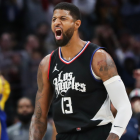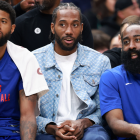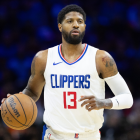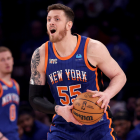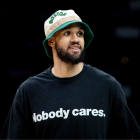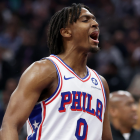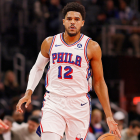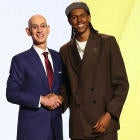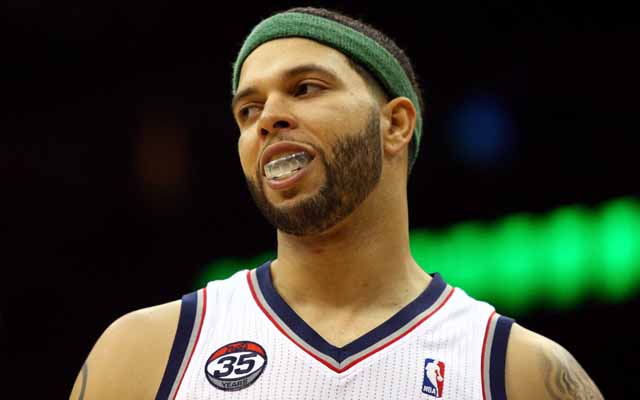 |
| Deron Williams has a tough decision on his hands. (Getty Images) |
The season is over, the draft is behind us. And yet things roll on. The NBA affords no break until the dog days of August, and as it stands, the whirlwind begins anew on Sunday night as the negotiation period for free agency begins.
Here are the biggest questions we face as the 2012 NBA Free Agency Period begins.
1. What's really most important to Deron Williams?
Deron Williams says he wants to win a title. That that's what's most important to him. In pursuit of this, he will, in all likelihood, re-sign with a team that has won 44 games in two seasons, that has six players on its roster, and if it is to keep its three best players, will have to pay the max for its best, and overpay for its second and third best.
So how is it that he can say he wants to win a title? The argument is that Dallas does not represent a better option. And maybe that's true. Dallas has significant disadvantages. Dirk Nowitzki is getting older (but will still be better next season than any player the Nets will have on opening night, considering the impossibility of obtaining Dwight Howard by then). Their young players are not stellar (but have played well on a playoff-caliber team in spot duty). There is no guarantee Mark Cuban will be able to pull off magic (but he is one of the most inventive and committed owners in the league with arguably the best management team and a terrific coaching staff on payroll).
But even beyond that, there are other places he could go. Indiana, with Danny Granger, Roy Hibbert, Paul George, David West, and a whole lot of depth would be a great option. There are teams he could play and compete for a title now. But he's not interested. And that's fine. It's about the money, the extra year and the raise incentives from re-signing with his Bird rights, about the extra endorsement money he gets from playing in Brooklyn.
On Twitter, Williams constantly asks why everyone acts like they know what he's going to do. And maybe no one does. But we have a pretty good idea of what he's not going to do next season: win a title.
2. Where does Boston go from here?
Well, for starters, we know Kevin Garnett will be back with the Celtics, per CBSSports.com's Jeff Goodman.
The Celtics have to make tough choices. With Jeff Green coming off heart surgery, they're likely to re-sign him. They will likely let Ray Allen go in free agency (and he'll sign for more than they're willing to pay). Rajon Rondo is the new face of the franchise. Can he be the best player on a championship team?
Is this team coming or going? That's the real question.
Paul Pierce and Garnett are both too old to make the kind of impact they have, even this season. Eventually, it's going to give. For as much as Garnett balked at talk of him being old, it did show in the conference finals and it's only going to get worse from here on out. So the Celtics have to move forward. Are first-round picks Jared Sullinger and Fab Melo the future? That seems unlikely.
They do have Avery Bradley and a host of young players with talent. But this season is likely to be a hybrid between the old guard making a farewell parade (Pierce, Garnett) and searching for the new guard and whether they can find an identity. It's going to be a very different Celtics team in the fall.
3. Does Steve Nash's sun rise elsewhere?
Portland seems like a natural fit.
Doesn't it?
The live-clean-live-free liberal lifestyle, the small-market, West Coast team with enough components to compete and enough salary space to take a whack at it? Portland certainly seems like a great fit for Steve Nash's whizzing whiz-kid passes and basketball poetry. It's an artist's town, and there isn't a better artist in the NBA, even now.
He says that money matters, and Portland will have it, plus he'll have good players to play with. It's the kind of combination you have to like.
But then there's Toronto and a reunion with Bryan Colangelo, finishing his career in his native Canada, closing the book with a fitting final chapter, even if the team isn't exactly perfectly built around him. And the Raptors reportedly are making a big push.
Or New York, and a much smaller payday, but maybe the chance to do something amazing with an array of talent that boggles the mind. But is there room for Nash's brilliance with ISOMelo? And what about their firing D'Antoni? It's just business, but everyone's got friends. Whoops.
Or there's Phoenix, the most logical and disappointing answer. The money, the peace of mind, the comfort. Finish where you started. Or, OK, not started, but began your MVP run, the stardom. Nash returning to Phoenix would crush the spirits of basketball fans who want to see him contend somewhere. But it might make him happiest.
That seems to be the biggest factor in all of this, and what that says about Nash you have to like.
4. The restricted stay home ... right?
Roy Hibbert was an All-Star this year. Teams can make an offer.
Eric Gordon is expected to be an All-Star within two years. Teams can make an offer.
Brook Lopez can score at a position woefully low on scorers. Teams can make an offer.
Ryan Anderson was worthy of most improved player last season. Teams can make an offer.
Nicolas Batum has had just about every team in the league make an offer to Portland for him. Teams can make an offer.
None of these guys go anywhere, right?
Restricted free agency means that a player's team can match any offer sheet a player signs. So if Indiana makes a hard and fast offer for Eric Gordon, the Hornets can simply say "match" and retain him.
Guys don't leave after their rookie deals. They just don't. That first contract is too much money, too crucial for one, putting them in another bracket of wealth, and two, setting them up long-term both in number of years and the raise structure. There's no indication that these guys will be going anywhere.
But if the new CBA, or coach disagreements, or general front office disarray leads to anybody sneaking out the door on another offer, it will be total chaos. All of these players are franchise changers, and all are out there. You just have to make an offer so good their teams have to refuse. Easier said than done.
Right?
5. Looking like a restructured free-agency model economically, how u?
One thing we definitely don't know is how the new CBA will affect free agency. For every DeAndre Jordan and Caron Butler deal in the protracted free-agency period in December, there were David West deals which showed a lot of restraint and sense.
Will the new CBA usher in a smarter, more conservative free-agency period, or will it just manifest itself in later years when teams, clogged by the kinds of contracts they'll hand out starting July 11, have to dump players in a hurry to avoid the more punitive tax penalties? There are a lot of concerns about how this new reality is going to shape things.
The long-term winners will be those that can keep their wallets from getting too excited. Don't feed them after midnight.









